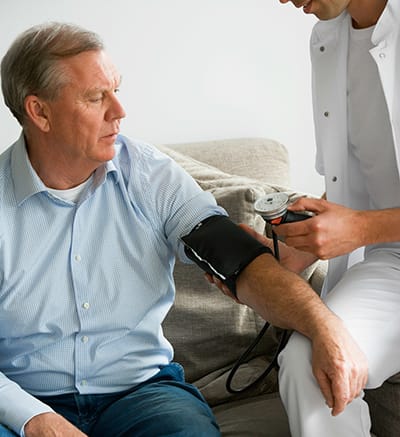Scheduling regular visits with your healthcare provider is an important part of maintaining a healthy life at any age, even when you’re feeling fine. Routine screenings are one of the most effective ways to prevent future health issues. But don’t take our word for it—the Centers for Disease Control estimates that nearly 100,000 lives could be saved each year if everyone in the United States received recommended clinical preventive care.
The purpose of these routine visits is to screen for existing medical conditions in order to catch them early, to assess your risk for future problems and to keep you on track in maintaining a healthy lifestyle. The types of screenings you should have and the frequency with which you should have them varies with age. Below, we’ve outlined the screenings that you should be having as you get older, and how often you should have them in order to live your healthiest life.

Ages 18-39
Physical exam – Every two to three years, you should see your primary care physician for an overall wellness exam. These visits should become yearly after age 40.
Blood pressure – There are no symptoms of high blood pressure, but its effects can be serious. You should have your blood pressure checked yearly, regardless of age. You can do this test yourself by using a machine at your local pharmacy or grocery store. If your blood pressure is higher than 140/90, consult your doctor.
Skin cancer – Men should examine themselves for skin abnormalities or changes to existing marks, such as shape, color, and size. If you see something out of the ordinary, schedule an exam with your dermatologist. You can also request to have a full body check with your physical exam.
Ages 40-49
In addition to continuing the above screenings, you should also be screened for:
Cholesterol – High levels of LDL, or ‘bad’ cholesterol, can cause serious health problems, including heart disease. After age 40, men should have a blood test once a year to check cholesterol levels. If you have a family history of high cholesterol, talk to your doctor about beginning testing sooner.
Eye exam – After age 40, you should have an eye exam done every two to four years. Your doctor may suggest having them more frequently if you suffer from vision problems.
Diabetes – You should be screened for diabetes every three years after age 45 through a blood test. If you are overweight, ask your doctor about beginning screening at a younger age.
Age 50 and over
In addition to continuing the above screenings, you should also be screened for:
Colon cancer – After age 50, you should be screened for colon cancer, especially if you have a family history or risk factors, such as inflammatory bowel disease, polyps, or ulcerative colitis. Screenings can be done through a stool occult blood test or a colonoscopy.
Osteoporosis – After age 50, you should discuss osteoporosis with your doctor. If you have any risk factors, he/she may suggest you have a screening. These factors can include a family history, low body weight and bone fractures after age 40.
Prevention is a critical part of maintaining healthy lives and ultimately living longer. Through frequent screening and early detection, you can prevent health issues and live a fuller, healthier life.
If you have questions about healthcare for yourself or a male loved one, call 1.866.KINDRED to speak to a Registered Nurse 24 hours a day, seven days a week.